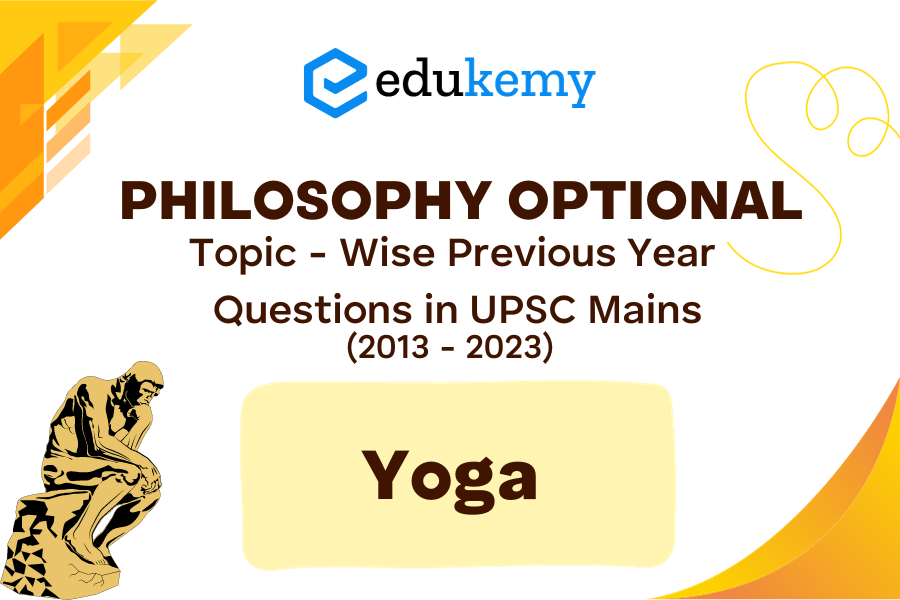
Embarking on the challenging journey of preparing for the UPSC (Union Public Service Commission) Mains examination is a formidable task, especially for those who choose philosophy as their optional subject. In this blog series, we will delve into the realm of one of the most intriguing and thought-provoking topics within the philosophy optional syllabus – “Yoga.” From the year 2013 to 2023, we will explore a treasure trove of previous year questions that have graced the UPSC Mains, offering valuable insights into the intricacies of this subject. Whether you’re a dedicated aspirant or simply a curious mind seeking to understand the philosophical underpinnings of yoga, this series promises to be a wellspring of knowledge and guidance. Join us as we unravel the profound wisdom and philosophical depth inherent in these questions, shedding light on the significance of yoga in the competitive landscape of UPSC examinations.
Yoga, with its rich history and multifaceted dimensions, transcends the boundaries of physical exercise and meditation. In the UPSC Mains, the subject of yoga opens up avenues to explore the profound connection between mind, body, and spirit, making it an incredibly intriguing choice for philosophy enthusiasts. This blog series will not only analyze the previous year’s questions but also offer insights into how to approach them effectively, providing a comprehensive understanding of the subject. So, whether you’re a seasoned philosophy scholar or a neophyte on the path to uncovering the philosophical gems this series will serve as a beacon of knowledge to help you navigate the vast sea of UPSC Mains with confidence and wisdom.
Contents
- 1 Yoga Philosophy – Previous Year Questions (UPSC CSE Mains History Optional)
- 2 FAQs
- 2.1 Q1: Is yoga a popular and relevant optional subject for the UPSC Mains examination?
- 2.2 Q2: What is the significance of studying philosophy in the context of UPSC Mains?
- 2.3 Q3: Are previous year questions helpful for UPSC preparation?
- 2.4 Q4: How should I approach the study of Philosophy as an optional subject for UPSC Mains?
- 2.5 Q5: What resources can I use to study yoga for UPSC Mains?
- 3 In case you still have your doubts, contact us on 9811333901.
Yoga Philosophy – Previous Year Questions (UPSC CSE Mains History Optional)
1. What is meant by ‘yoga cittavrittinirodha’ ? Explain cittavritti and its effects according to yoga philosophy. (2017/10)
2. What is bondage according to Yoga philosophy? Explain the method of attaining Kaivelya in Patanjali’s Yogasutra.(2015/20)
3. Explain the nature and levels of samprajnata Samadhi. How does each level lead more towards to asamprajnata Samadhi ? (2014/15)
4. Give a critical account of the accept of cittavritti in Yoga philosophy.(2013/12 ½)
5. Critically evaluate the statement that ‘ Yoga sutra emphasis more on praxis(action) than on theory ( reflection ). (2012/15)
6. Give your critical comments on the assertion that Yoga school broadly accepts Samkhya ontology . (2012/15)
7. “Yoga is more than a psycho-physical exercise”. Analyse this statement and support your conclusion with arguments. (2011/30)
8. Compare Patanjali’s Yoga with integral Yoga expounded by Aurobindo, bringing out clearly points of similarity and dissimilarity.(2009/60)
FAQs
Q1: Is yoga a popular and relevant optional subject for the UPSC Mains examination?
Answer: Yes, it is a relevant and increasingly popular optional subject in the UPSC Mains examination. The syllabus for the philosophy optional paper includes a section on Indian philosophy, where it is a significant component. As yoga has gained global recognition and plays a vital role in Indian culture and spirituality, it offers a unique perspective on various philosophical concepts, making it a compelling choice for UPSC aspirants.
Q2: What is the significance of studying philosophy in the context of UPSC Mains?
Answer: Studying philosophy for UPSC Mains is essential as it provides insights into the philosophical, cultural, and historical dimensions of Indian society. Yoga embodies profound wisdom, and understanding it can help aspirants contextualize various aspects of Indian philosophy and culture, allowing them to answer questions with depth and relevance.
Q3: Are previous year questions helpful for UPSC preparation?
Answer: Yes, previous year questions on this topic are incredibly beneficial for UPSC preparation. They provide a roadmap for the kind of questions that may be asked in the examination. Analyzing these questions and practicing answers can help aspirants refine their knowledge and exam-taking skills.
Q4: How should I approach the study of Philosophy as an optional subject for UPSC Mains?
Answer: To approach the study of philosophy effectively, start with a comprehensive understanding of its history, schools, and principles. Study the syllabus thoroughly and create a structured study plan. Additionally, practice answering previous year questions and engage in philosophical discussions to enhance your grasp of the subject.
Q5: What resources can I use to study yoga for UPSC Mains?
Answer: To study yoga for UPSC Mains, you can refer to various resources, including standard textbooks like “Yoga: The Science of the Self” by I.K. Taimni, “The Heart of Yoga” by T.K.V. Desikachar, and the teachings of renowned yoga philosophers like Patanjali and Swami Sivananda. Additionally, consider online courses, coaching institutes, and UPSC-specific philosophy optional study materials to aid your preparation.
In case you still have your doubts, contact us on 9811333901.
For UPSC Prelims Resources, Click here
For Daily Updates and Study Material:
Join our Telegram Channel – Edukemy for IAS
- 1. Learn through Videos – here
- 2. Be Exam Ready by Practicing Daily MCQs – here
- 3. Daily Newsletter – Get all your Current Affairs Covered – here
- 4. Mains Answer Writing Practice – here

